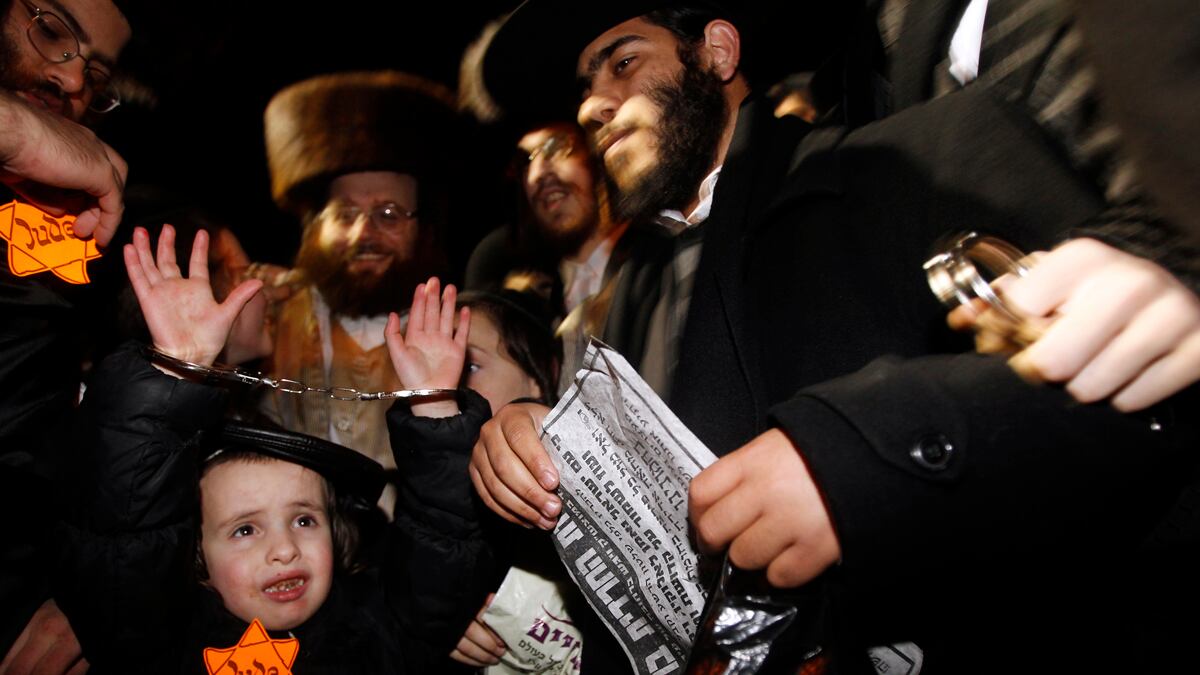An Israeli protest over the weekend by ultra-Orthodox Jews who dressed their children to look like inmates at a Nazi concentration camp highlights the sometimes peculiar role the Holocaust plays there in political discourse and even in everyday exchanges.
The spectacle at a Jerusalem square Saturday night, staged by the most extreme of the ultra-Orthodox community’s myriad factions, featured mostly adults but also several dozen kids in striped uniforms and yellow stars, evoking the Holocaust’s most iconic images. The demonstrators were protesting an effort by secular Israelis to roll back gender segregation on some bus lines and in certain neighborhoods—a dispute that has surged in recent weeks.
Politicians from across the spectrum voiced outrage, as did Jewish groups in Israel and abroad, describing the display as an ugly trivialization of the Holocaust, in which 6 million Jews were murdered by Nazis and their sympathizers.
But while it amounted to the most graphic insinuation in recent memory that Israelis are somehow perpetrating Nazi-like crimes against fellow Israelis, it was hardly the first time the Holocaust has been used cynically here in a political context.
In fact, even as Israel zealously guards the memory of the genocide, many Israelis invoke it frivolously in a manner that can seem shocking to outsiders and might even be illegal in some countries (the EU has a provision against trivializing the Holocaust, as do several European countries individually).

“People in Israel misuse the Holocaust in politics and other areas all the time,” says Yehuda Bauer, a Holocaust historian and the academic adviser to Yad Vashem, Israel’s primary Holocaust memorial and museum. “It’s used mainly by the right wing but also by the left and center” to vilify political adversaries.
In its more benign form, Israelis might talk about the 1967 line that divides Israel and the West Bank as “the Auschwitz border,” or equate Iranian President Mahmoud Ahmadinejad with Adolf Hitler. Bauer recalls that during Israel’s Lebanon war in 1982, Prime Minister Menachem Begin famously likened the blockade against PLO leader Yasir Arafat in Beirut to the siege on Hitler’s bunker near the end of World War II.
“The comparisons tend to dilute the real significance of the Holocaust,” he says.
But it’s not uncommon to hear Israelis refer to other Israelis as Nazis as well. Jewish settlers regularly use the term against Israeli soldiers in the West Bank, as when troops are sent to dismantle unauthorized outposts. The late Yeshayahu Leibowitz, a well-known left-wing intellectual, once described settlers as “Judeo-Nazis.” Israeli traffic cops occasionally complain they’re called Nazis by the motorists they pull over.
Abraham Foxman, who directs the Anti-Defamation League, an American organization that fights anti-Semitism and other bigotry, says the inappropriate Holocaust references are the result of ignorance and the passage of time. He describes them as part of a worldwide phenomenon.
“Trivialization of the Holocaust is booming. Just look at our political campaign here,” he says. In one example, he cites Florida Congressman Allen West’s remark last month about how Nazi propagandist Joseph Goebbels would be “very proud” of Democrats for their misinformation campaign against Republicans.
On the other side of the globe, Foxman says, India had since November been airing a daily soap opera named Hitler Didi about a young woman whose obligations at home and work have turned her into a humorless disciplinarian. When the ADL and other groups complained, the network changed the show’s name to General Didi.
But it’s in Israel where the references seem most bewildering. The country has the largest population of Holocaust survivors in the world—some 200,000. Israel marks the genocide every year with a haunting siren that wails across the country. Yad Vashem is one of the first places foreign dignitaries are taken during official visits.
Nachman Shai, a member of Israel’s Parliament from the centrist Kadima party, said he would author a bill making trivialization of the Holocaust illegal in response to the ultra-Orthodox protest, which went on for several hours and received extensive coverage in the Israeli press. “I feel there’s a vacuum [in the legislation], and we have to fill it right away.”
Shai said the protesters displayed the most evocative symbols—including having children raise their hands to mimic an iconic photo of a Jewish boy at the Warsaw ghetto—knowing they would provoke Israelis. He said ultra-Orthodox rabbis must have authorized the stunt. “This community doesn’t do anything without the permission of the rabbis.”
Bauer, the academic adviser to Yad Vashem, says that for Jews and Israelis, misusing the Holocaust has a psychology of its own. “Israel is a traumatized society that is thrown back onto the trauma all the time,” he tells The Daily Beast. “When a society is traumatized like that, any opponent or perceived enemy is immediately equalized with the worst enemy Israel ever had.”






